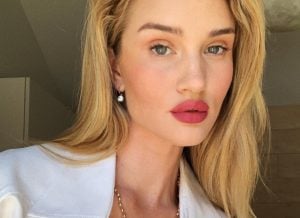It’s 2021, and like all good 21sts, beauty has finally come of age. While we know more about skincare than ever before, have more access to beauty technology and anti-ageing treatments, and can tune our faces at the flick of a filter, it seems that beauty ideals are (happily) running the other way. In the nineties and noughties, you would have been hard pressed to find a woman of colour in the glossy mag pages that were our beauty bibles. Plus size bodies were nowhere to be seen, let alone transgender and non-binary folk, women over thirty, or anyone who didn’t look like Paris Hilton, Keira Knightley, or Claudia Schiffer. And while nineties lip liner may have made a comeback, I’m glad to wave goodbye to the one-look-wonder years and see the beauty in diversity finally celebrated. Welcome to the new dawn…
Image credit: Tavaris Jefferson
1. Beauty has no gender
The rise of social media has democratised beauty. In 2021, influence is power and you only need a phone to wield it. Some of the most talented and creative voices in beauty and style have proven that self-expression has nothing to do with X or Y chromosomes. Australian Deni Todorovic is an ex-Cosmo fashion stylist, non-binary darling, your Instagram BFF, and Australia’s answer to Queer Eye’s Jonathan Van Ness. I dare you not to fall in love with them. Trans icons like Janet Mock and Orange Is The New Black alum Laverne Cox are regulars on best dressed lists. And of course makeup superstars Jeffree Starr and James Charles are YouTube royalty, and represent a long-overdue change in the way we see beauty and gender.
2. Size does matter
Size zero has been dethroned. While fitting into skinny jeans was once vital to any movie makeover scene (hello, The Devil Wears Prada), and plus-size clothing options were limited to the frumpy and uncool, the tide has finally turned. With harmful diet culture getting the scrutiny it deserves, we’re now seeing discourse emerge around body neutrality, fat-shaming, and size-inclusivity. The plus-size beauty movement is flourishing thanks to stars like Tess Holliday, the force behind the #effyourbeautystandards hashtag that swept Instagram. Australia’s Flex Mami represents a new wave of influence with a signature aesthetic that defies trends and challenges brands to do better. GIRLS creator Lena Dunham has been vocal about her weight gain’s direct correlation to her mental wellbeing, and activists such as Roxane Gay (read her book Hunger for a wake up call) are calling out the woeful way the world treats fat people. One size has never fit all. And nor should it.
3. We see colour
You don’t need me to tell you that 2020 was the racial tipping point we desperately needed. With the Black Lives Matter movement being rightfully amplified globally, we’ve seen the floodgates open on everything from representation in brands’ social media and marketing campaigns, to amplifying black voices and platforming people of colour in the industries they’ve been invisible in, for far too long. In the beauty world we’ve seen shade diversity demanded, cultural appropriation corrected, and our language reconsidered (‘nude’ is not a colour). And it must be said that the two points before this – size and gender inclusivity – have been hugely driven by people of colour. We have a long way to go, but we’re going there.
Image: Instagram @seedandsproutco
4. Sustainability is stylish
From aerosols to plastic packaging, single-use products and enough chemical pollutants to make you shudder, the beauty industry has a pretty ugly side. But in 2021 we’re seeing the rise and rise of sustainable hair salons, eco-conscious beauty brands, and packaging free products like shampoo bars and powdered dry shampoo. Even our toothbrushes and cotton tips are getting the sustainable seal of approval. And we’re on board – Beauticate is launching a new sustainability section on the site this year, to find out how we can keep the planet as beautiful as our bathroom shelfies.
Image: Instagram @lehcar0910
5. Flaws are for flaunting
Pores, stretch marks, blemishes, and even body hair: the things we’ve been told to cover or ‘correct’ are finally being celebrated. Magazines are vowing to ditch the photoshopping, models like Winnie Harlow – a champion of the skin condition Vitiligo – are changing the face of fashion, and the ‘Instagram versus reality’ trend is blazing (who doesn’t love a Celeste Barber challenge?) Cellulite, gappy teeth, freckles; it’s time to let them shine.
Above all, the number one beauty tip in 2021 is to be yourself. Self-love is the new self-loathing – and that’s a beautiful thing.
Story by Gemma Dawkins, holding shot from Instagram @winnieharlow










